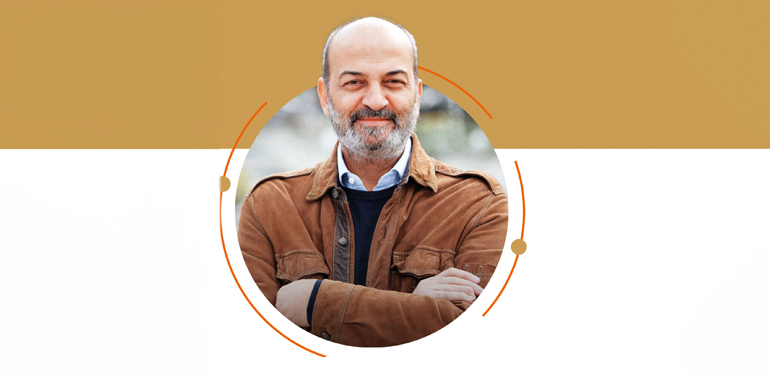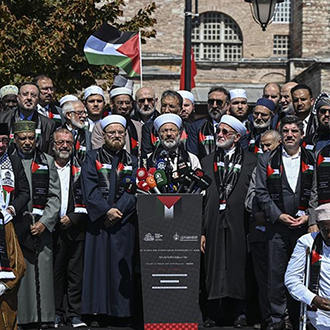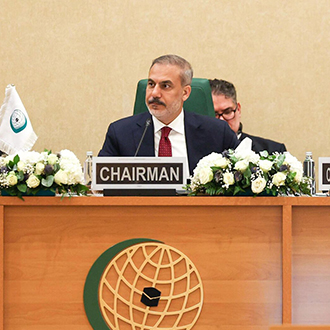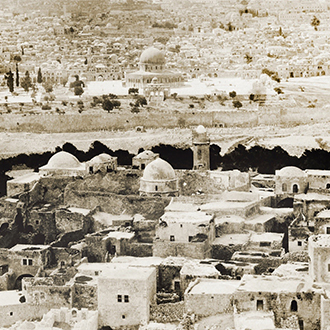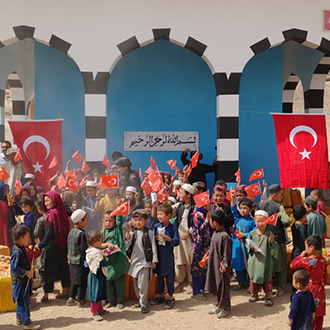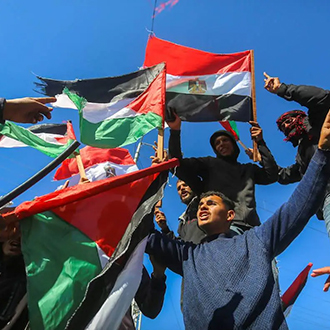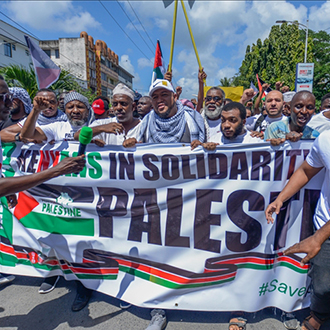I’m not in favor of using the adjective “modern”. Regardless of whether something is considered modern or not, the human being is the same. We have the same desires, the same drives, and the same aspirations. ‘Modernity’ is a Western concept and it is used either to justify certain Western manipulations of human nature or opposition to that. However, the human being is the most exalted creation with the basic touch, and the touch in this origin of the human being is divine. Thus, every human being is carrying a touch of the divine. The Muslim is the one who is truthfully aware of his origin and his nature. He is the one who has awakened. The non-believer is in a state of sleep, maybe he will be awakened sometime. That is why we do not accuse nor do we despise non-Muslims. They are human beings, they are the creation that is the most important and highest. Indeed, the human being is the reflection of Allah and a mirror of Allah. Why? Because the beauty, power, compassion, mercifulness, whatever you can think of —which are the derivations of the holy names of Allah— are reflected in us. Therefore, the basic understanding of the human being is actually that he is not alone. The human being is not an isolated part of the creation. He is a part of the creation and he is realizing himself as long as he is aware of this unity with the creation. The real awareness is that we are coming from the One and we are traveling towards the One. If you keep in mind that you are coming from Allah who is the One and you are going to meet Him in the Hereafter that gives real value to being a human.
The Prophet Muhammad (saw) and the believers built a society of Islam. If we open a window from the age of bliss (asr al-sa’adah) to the modern world, what are the dimensions of Muslims building a world in which they will exist with their values?
These are all sociological questions. I have always had some reserve about sociology, especially the Western-produced sciences. Man, society, humanity, the universe, the characterization of this relationship is quite secular. Sociology teaches of a secular society. I would like to express my reservation regarding this matter. As a Muslim, I have concerns. Sociology may be beneficial in some regards, but it cannot determine how I characterize myself and society. Primarily, every Muslim bears individual responsibility towards Allah. However, this responsibility is also inherently social in nature. It is not only isolated within me. I am responsible before Allah also for my actions towards others around me in society. To build a society you have to build a human being. However, that cannot be carried out by the government or schools. These are also some types of deceptions. We always think that some institutions do certain things. However, they cannot erect a human being. They can only support or facilitate the life of a human being. These are two different things. The real constructive building of human beings is carried out by other human beings. Therefore, a human being cultivates the human being. Not the walls, not the schools, not the buildings, not the institutions, programs, policies, and so forth. These are all secondary instruments. The primary instrument is always your mother, your father, a good person you know, the author you like, and so on.
We are products of other human beings and everything in society begins with human beings and ends with human beings. The institutions can only act as mediators and assist in that regard; they cannot go beyond that role. Therefore I have to do certain things for Allah. This is my duty first and foremost, and then I can think of other things, but they are all intertwined. To make such general statements about societies, the world, generations, etc., you have to first ask yourself, what are you doing? What kind of person are you? It is easier to instruct people, but it is very difficult to instruct yourself. You have to first adapt this hard way to question yourself to open up the way for other people, for you have to be good to yourself so that you can disseminate that goodness to other people. Everything begins with the individual.
Values are the basic criteria that guide our individual and social lives. The individual tries to give meaning to his life through the values he possesses. At this point, what can you say about the relationship between values and “morality”?
There are very stark differences between the word morality or ethics and akhlaq. This is because they refer to different things. Ethics comes from the ancient Greek word ethos, which means peoples, societies, customs, traditions, etc. Whereas morality comes from the Latin word mores, which means again the same thing as the traditions of a certain society but akhlaq does not have any relation to the society or traditions. Akhlaq refers directly to your creation. It comes from the Arabic root Hulk, which means creation. So being moral means you are conforming to the conventions of the society you are living in, but having akhlaq refers to you conforming to the nature of your creation by Allah. These are two different things because many societies have conventions, principles, and traditions that are against creation which may be haram. For example, in the West, taking interest is an ethical thing. It is even theoretical. There is a theory of interest in economics, it is ethical, but for a Muslim it is haram. In today’s society, all kinds of perversion are seen as legitimate. However, a Muslim cannot simply accept it solely because it is deemed normal by the broader society. We are not basing our value judgments on what exists, but rather on what is created, what is original. Therefore, these are two very different things. Being moral in the Islamic sense, having akhlaq is following the path of our Prophet (saw) because he is the concrete example of akhlaq. How he behaved, how he smiled, how he argued with people, how he fought in the war—these are all parts of the same akhlaq.
Another problem with the modern understanding of ethics is that it is actually fractured. You have business ethics that have different sets of rules about what is right and wrong. Subsequently, you have political ethics, which is again very different from business ethics. Then, when you return home, there are distinct rules of family ethics. Moreover, when interacting with others, you encounter yet another distinct set of ethical rules. Then there is the additional layer of ethics surrounding identity and so on. Thus, the modern Western understanding of ethics is fragmented.
In Islam, everything is integrated and harmoniously complements each other. There are no conflicting or contrasting sets of rules based on your profession or occupation or the role that you are playing in society. Therefore, we find unity in morality. That is what we must consider. Otherwise, when you fracture ethics, it becomes relativized, with different ethics for different tasks, professions, people, genders, etc. As a result, it becomes impossible to create a coherent, harmonious society by bringing together these contrasting pieces. In Islam, akhlaq makes you one in yourself, also with your environment and with Allah. This is because ‘hulk’ implies the existence of a Khaliq, a Creator, and as long as you adhere to the principles set forth by your Creator, you possess akhlaq.
Another important aspect is that the ethics of the West requires the presence of multiple individuals. An ethical relationship can only be established when there is interaction between two or more people. However, in Islam, even if you are just one person in the world with no one else around, you are still obliged to uphold akhlaq because your relationship is not solely with others, but also with your Creator. This fundamental existential distinction is significant. Therefore, we must exercise caution when we equate concepts of Islam with the concepts of the West, because they may be quite different. By blindly equating them, we risk sacrificing our own values in favor of Western ideals.
To what dimension do the concepts of unlimited equality and freedom in the modern world lead humanity, do you think that these concepts lead to a loss of values?
The portrayal of the situation as unlimited freedom may also be misleading because the people are not free, even if they claim to be free. For example, in many European countries, we have Queens and kings at the head of their state. They control many legislative procedures. So in that regard, a monarchy at the head of a democracy is unthinkable. Yet, that is what is observed. So they are not free. The people elected in the United Kingdom, they cannot pass a law until the Lords who are appointed alone by the King confirm such legislation. So, what kind of freedom and democracy do we truly have in such circumstances? These questions often lead to conflicting perspectives and debates.
Freedom is a philosophical concept, and philosophy is based mostly on justifying what is favorable to the powerful. So freedom has always been used by governments, the power structures, to advance their own interest. When you say freedom, you are referring to liberalism. Liberalism alone is based on this idea of freedom, rights, etc. One of the forefathers of liberalism is John Locke, a British philosopher. He was a shareholder in the London Stock Exchange of a company that bought and sold slaves. This hypocrisy is the hallmark of kufr. It is not West or East, it is kufr. The non-believing produces a diversion within oneself and within the universe. Hence, in contemporary discourse about freedoms, it is easier to indulge in perversion, cruelty, and exploitation than to practice mercy, generosity, and altruism. There are more impediments to genuinely helping others with good intentions than there are to engaging in various forms of immoral behavior.
It boils down to the same question. How do you define yourself? Do you define yourself based on some secular philosophical explanations? Thus, a Muslim should always choose the second one. When you define yourself in relation to Allah, then your relationship with other people and concepts becomes different. If I am a servant of Allah, I see other people as the creations of Allah. I respect them for that reason, not because of the law or legality or some social customs, etc. It supersedes all of them. So it is a very existential relationship and I think we have to make this distinction very clear.
Recently, there has been a search for a new order that is to be created with the discourse of freedom and equality over sexual identity. How do you think the Muslim individual should respond to this?
First of all, in Islam, it is not a very good thing to publicly talk about such perversions, because public discussion of such perversions is an instrument actually to justify those perversions themselves. Sometimes, it is wiser to remain silent about these matters than to engage in constant debate, discussion, or complaints. I do not even use the abbreviation they are using for perverted people deliberately, especially because using that acronym itself is a justification for that kind of perversion. These are perversions under my religion.
Another crucial aspect is how this phenomenon exacerbates the division and degradation of humanity. This process of fracturing began in the West during the Renaissance when human beings were separated from Allah. It then progressed to further divide the human mind and heart. Moreover, it was further exasperated by saying that one person is a Westerner, while the other is an Easterner.
Therefore, it is a constant process of actually splitting up and fracturing the human being. Now, individuals are defined by their sexual orientation or other similar traits. Thus, one is being defined by that kind of person. This shows the misery of the Western understanding of the human being. There are other aspects that we, as Muslims, must be cautious about, and one of them is the concept of gender. Using this term can be problematic. I refrain from using such terminology because adopting it can inadvertently validate or justify certain perspectives or behaviors that contradict Islamic teachings.
What would you like to say as the final word to our readers?
Please never place anything above Allah and His Prophets (saw). Whatever you have, whatever you study, whatever you learn, whatever you do, put it under but never above. Secondly, Iman is not an accessory. It is not a small thing. It is everything. Do not forget yourself. You are a Muslim. You are not just a free-floating person. You have your criteria. Learn those criteria and apply them to your individual life in whatever you are doing.



